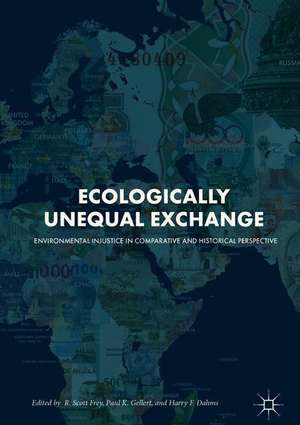Ecologically Unequal Exchange: Environmental Injustice in Comparative and Historical Perspective
Editat de R. Scott Frey, Paul K. Gellert, Harry F. Dahmsen Limba Engleză Hardback – 18 iul 2018
| Toate formatele și edițiile | Preț | Express |
|---|---|---|
| Paperback (1) | 944.67 lei 6-8 săpt. | |
| Springer International Publishing – 2 feb 2019 | 944.67 lei 6-8 săpt. | |
| Hardback (1) | 954.93 lei 6-8 săpt. | |
| Springer International Publishing – 18 iul 2018 | 954.93 lei 6-8 săpt. |
Preț: 954.93 lei
Preț vechi: 1164.56 lei
-18% Nou
Puncte Express: 1432
Preț estimativ în valută:
182.75€ • 190.09$ • 150.87£
182.75€ • 190.09$ • 150.87£
Carte tipărită la comandă
Livrare economică 14-28 aprilie
Preluare comenzi: 021 569.72.76
Specificații
ISBN-13: 9783319897394
ISBN-10: 331989739X
Pagini: 284
Ilustrații: XVII, 331 p. 5 illus., 4 illus. in color.
Dimensiuni: 148 x 210 mm
Greutate: 0.72 kg
Ediția:1st ed. 2019
Editura: Springer International Publishing
Colecția Palgrave Macmillan
Locul publicării:Cham, Switzerland
ISBN-10: 331989739X
Pagini: 284
Ilustrații: XVII, 331 p. 5 illus., 4 illus. in color.
Dimensiuni: 148 x 210 mm
Greutate: 0.72 kg
Ediția:1st ed. 2019
Editura: Springer International Publishing
Colecția Palgrave Macmillan
Locul publicării:Cham, Switzerland
Cuprins
Introduction: Ecologically Unequal Exchange in Comparative and Historical Perspective; R. Scott Frey, Paul K. Gellert, and Harry F. Dahms.- Part I: Theoretical Foundations of Ecologically Unequal Exchange.- 1. Toward a Theory of Ecologically Unequal Exchange; Stephen G. Bunker.- 2. Ecologically Unequal Exchange and Raw Materialism: The Material Foundations of the Capitalist World-Economy; Paul Ciccantell.- 3. Ecologically Unequal Exchange and Ecological Imperialism: Conceptualizing their Relation and Distinction; Mariko Frame.- 4. Bunker's Ecologically Unequal Exchange, Foster's Metabolic Rift and Moore's World-Ecology: Distinctions with or without a Difference?; Paul K. Gellert.- Part II: Cases of Ecologically Unequal Exchange in Comparative and Historical Context.- 5. The Entropy Curse; Laura McKinney.- 6. Mining Exports Flows, Repression, and Forest Loss: A Cross-National Test of Ecologically Unequal Exchange; Jamie M. Sommer, John M. Shandra, and Carolyn Coburn.- 7. From Sea Slavesto Slime Lines: Commodification and Unequal Ecological Exchange in Global Marine Fisheries; Brett Clark, Stefano B. Longo, Rebecca Clausen, and Daniel Auerbach.- 8. History Matters: Contingency in the Creation of Ecologically Unequal Exchange; Shellen Wu.- Part III: Thoughts on What Is Being Done? What Is to Be Done? And Who Should Do It?.- 9. Global Climate Justice Activism: ‘The New Protagonists’ and their Projects for a Just Transition; Jackie Smith, with Jacqueline Patterson.- 10. Splintering South: Ecologically Unequal Exchange Theory in a Fragmented Global Climate; David Ciplet and J. Timmons Roberts.- Epilogue: Ecologically Unequal Exchange in the 21st Century: The Logic of Capital, the Perversion of the Social, and the Destruction of Nature; Harry F. Dahms and R. Scott Frey.
Notă biografică
Harry F. Dahms is Professor of Sociology, co-director of the Center for the Study of Social Justice, and co-chair of the Committee on Social Theory at the University of Tennessee – Knoxville, USA. He is the editor of ‘Current Perspectives in Social Theory’ and director of the International Social Theory Consortium.
R. Scott Frey is Professor of Sociology and co-director of the Center for the Study of Social Justice at the University of Tennessee – Knoxville, USA, and Senior Associate Researcher at the Laboratory for Comparative Social Research at the National Research University, Russian Federation.
Paul K. Gellert is Associate Professor of Sociology at the University of Tennessee – Knoxville USA and Affiliated Fellow at the Royal Netherlands Institute of Southeast Asian and Caribbean Studies (KITLV), the Netherlands.
Textul de pe ultima copertă
At a time of societal urgency surrounding ecological crises from depleted fisheries to mineral extraction and potential pathways towards environmental and ecological justice, this book re-examines ecologically unequal exchange (EUE) from a historical and comparative perspective. The theory of ecologically unequal exchange posits that core or northern consumption and capital accumulation is based on peripheral or southern environmental degradation and extraction. In other words, structures of social and environmental inequality between the Global North and Global South are founded in the extraction of materials from, as well as displacement of waste to, the South. This volume represents a set of tightly interlinked papers attempting to assess ecologically unequal exchange and to move it forward. Chapters are organised into three main sections: theoretical foundations and critical reflections on ecologically unequal exchange; empirical research on mining, deforestation, fisheries, and the like; and strategies for responding to the adverse consequences associated with unequal ecological exchange. Scholars as well as advanced undergraduate and graduate students will benefit from the spirited re-evaluation and extension of ecologically unequal exchange theory, research, and praxis.
Caracteristici
Assesses the theory of Ecologically Unequal Exchange from a world-system approach Reflects critically on the foundational insights of Stephen G Bunker Uses an energy-based accounting of unequal exchanges to demonstrate how inequalities are produced
